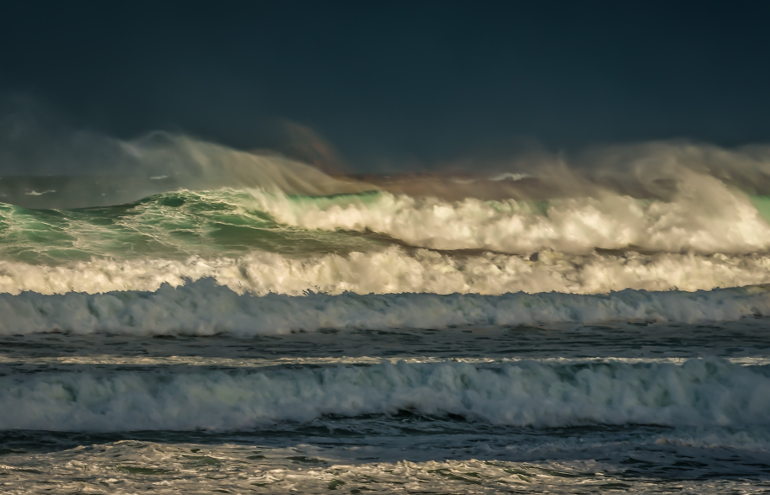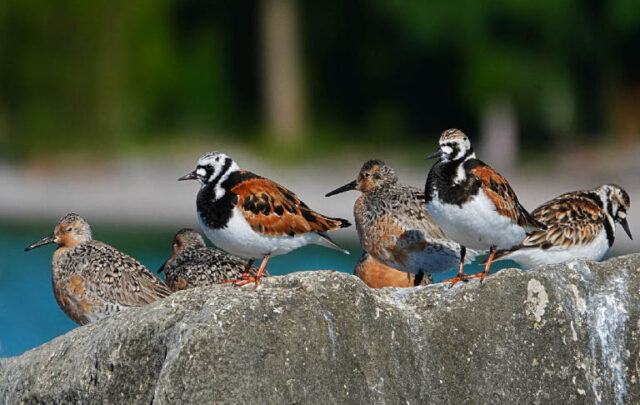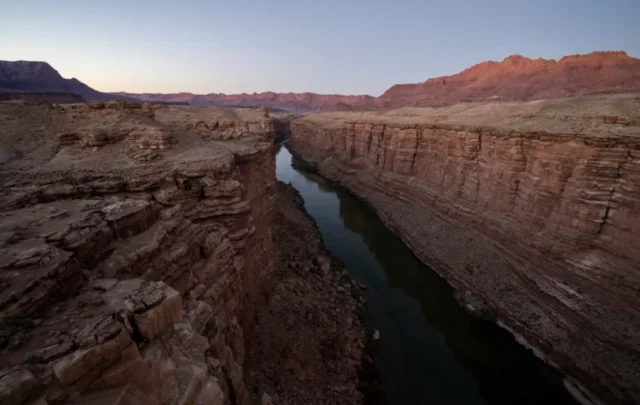(Gail is co-founder of Extinction Rebellion and Jem is founder of the Deep Adaptation Forum)
As global heating speeds up, humanity can no longer assume to control our destiny. We can let that tough realisation sit heavily with us, but then breathe and redouble our commitment to life and love, no matter what the odds, opposition or outcomes.
Because the news is not good. One institute reports that the global average temperatures over the past 12 months have been nearly 1.3C degrees above pre-industrial levels. Atmospheric carbon concentrations keep growing, reaching levels not seen for 3 million years when the world was up 3 to 4 degrees warmer than today, sea levels were 20 metres higher and camels were ranging around the North pole. Just as unprecedented summer temperatures swept the Arctic, 16 climate scientists concluded in an academic journal that “the Arctic is currently experiencing an abrupt climate change event, and that climate models underestimate this ongoing warming.”
What does this rapidly changing climate mean for us? A new book by French scholars concludes that the collapse of industrial consumer societies is now likely because of the climate and ecological crises. Another new study calculates that civilisation has a 90% chance of collapse within decades. That is why some of the world’s top climate scientists are saying “it’s time to talk about near-term collapse”.
You may have heard all of that before. And heard the call to act before it is too late to stop disaster. But you may have also seen how the juggernaut of the global economy continues to drive us off the cliff, with its advertising and media hands blinkering us as we fall. Even the United Nations warning us that climate and ecological destruction has made outbreaks of coronavirus more likely is ignored in the rush of elites to get us back to ‘normal’.
So if you haven’t felt like crying, you haven’t been paying attention; or perhaps you have been numbed like so many of us by our culture. Our hurt is not something to suppress, or seek a distraction from. Our tears can be a truth that we can integrate into our being. Then we can be honest with each other about the path ahead. Because it is a path of both despair and dedication. Paying attention fully to what is around us and in front of us, even though it hurts, is to be fully alive. As Kahlil Gibran wrote, “the deeper that sorrow carves into your being, the more joy you can contain.” There is a calling we are hearing, to witness the beauty of life on Earth, even as so much is being lost, in the same way we would tend the bedside of a dying loved one.
Talking to psychologists, activists, and spiritual leaders over the past couple of years, both of us have heard about the fearlessness that arises from an acceptance that everything we take for granted might be impossible to save. Once we accept that anxiety and grief will be constant companions in this struggle, we can stay fully present to what is happening and respond accordingly. It means we do not grasp desperately at the latest idea of what might fix the climate and ecological emergency. Instead, we can help each other stay fully present to the difficult mess, so that we can try to reduce harm, save what we can and plant some seeds for what might come next. We have also learned that the greatest personal transformations come from staring into the abyss of loss, whether of one’s own health, the end of a relationship, status, or someone we cherish. Could our collective transformation be born of a willingness to fully face what we have done and what we are losing?
This outlook is not usual or welcome in our death phobic western culture. The compulsion for positivity and progress runs through every walk of life. It means that some people may even feel disgust or anger that others don’t share their view that the future can be better than today. Such feelings can be fueled by those industry sectors that see any mention of societal collapse as a threat. They do not want to dent the enthusiasm of prospective owners, insurers and regulators of their multi-decade business plans for new power stations. It is a concern that the UK’s nuclear industry vision of providing 40% of the country’s electricity by 2050 does not include any mention of climate change adaptation, despite being offered as a necessary response to the climate crisis. As such sectors often have the backing of their governments, that is a huge vested interest ready to subvert the environmental movement by demonising anyone who thinks the worst case scenarios are plausible and should form part of our policy discussion.
The risk is that such subversion could cost us focus and lose us time. Sometimes people criticise Extinction Rebellion for sounding too alarmist and the Deep Adaptation agenda for being too defeatist. We would like to invite the opposite view. Extinction Rebellion is not alarmist for citing credible science on worst case scenarios which have not been included in lengthy processes of international consensus. Rather, it is alarmist to scare people away from looking at the full range of climate science with warnings it is damaging to consider them. People involved in discussing their own Deep Adaptation to anticipated societal collapse are not defeatist. They are creatively exploring how to prepare for societal disruption and likely collapse. It would be defeatist to think we can’t imagine how we might reduce harm during a potential collapse and transformation of societies.
The two movements are quite distinct and complementary. In its first two years of existence, Extinction Rebellion has not focused on either societal collapse or climate change adaptation. Instead, the focus is on forcing the climate emergency onto media and government agendas so we start cutting carbon emissions and restoring environments in ways commensurate with the situation. However, with such little change, polluter bailouts and rebooting business-as-usual after the outbreak of Covid-19, responsible citizens must now face reality. Climate change will get a lot worse and so societal collapse is a likely scenario for many countries. It is time for serious conversations about how to hold communities together, so that we keep and grow what we value, while reducing emissions further so as to give future generations a better chance.
That is not doomism, it is paying attention. In particular, it is paying attention to all of the sciences and evidence before us. Aiming for the best while preparing for the worst has always been complementary. Preparing for potential societal collapse does not mean we pay less attention to cutting and drawing down carbon. To consider that societies may collapse is not giving up, but opening up to a necessary agenda. The concept and framework called ‘deep adaptation’ has now spawned a community of people who are exploring what anticipating collapse means for them and their communities. It is a necessary conversation that has developed separately from Extinction Rebellion and largely word-of-mouth, away from the headlines. From both personal experience and new research, it is becoming clear that people are being creative and courageous in how they respond to this situation. Some people are creating community gardens, others are organising grief circles, and still others are becoming active in climate strikes and non-violent disobedience.
As people explore this topic and overcome their initial feelings of shock and vulnerability, more people begin to wonder what we might learn from people who have experienced collapse in their own lives or culture. People alive today are experiencing the sharp end of contemporary colonialism, as their ecosystems and livelihoods are destroyed. Over 40% of the people killed last year while trying to prevent industry from taking their lands were indigenous. Perhaps only now, as our own cultural confidence crumbles, will we begin to listen and learn from indigenous cultures. We could learn from the wisdom of Native American elders who identified a mind virus of ‘wetiko’ in the culture of colonial settlers, leading to an unchecked desire to control and consume the life of others. Perhaps then we will not participate anymore in the economic systems that destroy their lives and find more ways to live in solidarity and relationship.
Learning from indigenous cultures can seem a long way away from analysis of emissions and the latest climate modelling. But our success in future will require bridging different worlds. Including different fields of knowledge. One of the key messages of climate campaigners over the years has been – “listen to the science.” That is a clear message to policy makers whose economic policies, amongst others, have not placed the climate emergency at the start of their policy thinking. But as we assess why society has not been changing, and how it may change in future, it is important to recognise those questions are not the realm of climate science, nor any natural science at all. Instead, it is the realm of the social sciences. Therefore, our message as climate activists now needs to be: “listen to all the sciences.” By that, we mean listening to the humanities, philosophy, social psychology, critical sociology, political studies, heterodox economics, decolonial cultural studies and educational theory, amongst other fields of scholarship that can help us navigate the turbulence ahead.
We know that many climate scientists are asking themselves what they should do to help humanity in this terrifying environmental situation. Waking up to the extent of the disruption ahead involves some difficult reflection on one’s worldview and role. Such scientists have an important voice in how the general public make sense of our predicament. So it is important that climate scientists explore openly how to use that role wisely, in order to help not hinder social change. If they can recognise the merits and role of scholars from other disciplines, then the sum total of the effect will be far greater, and they will stand shoulder-to-shoulder with those environmentalists who are ready to question and change absolutely everything to give humanity a better chance.
Teaser photo credit: Photo by Urmi (License: Creative Commons BY)





